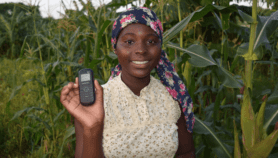By: Talent Ng’andwe
Send to a friend
The details you provide on this page will not be used to send unsolicited email, and will not be sold to a 3rd party. See privacy policy.
[LUSAKA] E-governance could help Ghana’s higher authorities to deal responsibly with its new-found oil wealth, a leading scientist has said.
In 2007, UK firm Tullow Oil announced the discovery of about 600 million barrels of offshore light oil in Ghana — the biggest recent oil discovery in Africa.
But the country must develop new ways of interacting with its citizens and be more open to the public on activities within the oil industry to avoid conflict, said Akua Appiah-Akuramaa from the Geological Survey Department of Ghana. She was speaking at the 5th International Conference on ICT for Development, Education and Training — eLearning Africa 2010 — held in Zambia last month (26–28 May).
The conference is an annual gathering of people involved in all aspects of information and communications technology (ICT)-supported teaching and learning.
Akuaramaa said that business operations have changed following significant advances in digital connectivity and ICT.
E-governments make use of these new technologies to facilitate more transparent relationships with citizens.
"Good governance cannot be achieved without transparency," wrote Akuaramaa in a paper she presented at the conference.
In Ghana’s case, said Akuaramaa, it will enable citizens to see how much money oil companies are paying to the government and how much is being used for the social betterment of the people.
She described three existing examples of e-governance improving transparency in Ghana.
The School Selection Placement System places children in senior secondary schools according to raw scores achieved in six subjects. These scores are sent to all junior secondary schools. As well as being more cost-effective this has reduced occurrences of human error, promoted fairness, and removed regional restrictions on candidates.
Ghana Community Network Services, which processes trade and customs documents electronically, has provided access to a common database for regulatory agencies. It has also enabled accurate, ‘real time’ revenue accounting and the monitoring and tracking of consignments from port to destination.
And before the National Health Insurance Scheme was automated, it was susceptible to fraud, late payments of claims, and the slow processing of identification cards.
But Vivian Attah, training coordinator at the Ghana Institute of Management and Public Administration told SciDev.Net that for e-governance to succeed Ghana must train more technicians to handle the system in relevant government institutions, fight vandalism and invest in energy-generating facilities to address the issue of electricity shortages.
She added that e-governance will also help replace hard copy documentation scattered in different institutions.













